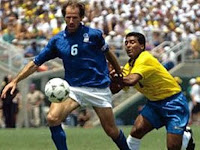However, one thing has to be said, being the captain in Italy is always much more prestigious than in other countries (with a few exception, of course) just for the fact that Italy has always high chances of becoming world champion. Four of Italy's captains have had the insuperable honor of lifting the trophy to the sky to celebrate a World Cup victory: Giampiero Combi, Giuseppe Meazza, Dino Zoff, and Fabio Cannavaro.
Here is the full list of all the captains that have led the Nazionale to the glorious journey of the World Cups:
- 1934: Giampiero Combi (1902-1956). Goalkeeper. 47 international caps with Italy. World Champion.
- 1938: Giuseppe Meazza (1910-1979). Forward. Considered the best Italian player of all time. 53 international caps (33 goals). World Champion in 1934 and 1938. So legendary he even got the name of a stadium in his honor.
- 1950: Riccardo Carapellese (1922-1995). Forward. 16 international caps (10 goals).
- 1954: Giampiero Boniperti (1928). Forward. 38 international caps (8 goals).
- 1958: Italy did not participate in this world cup.
- 1962: Lorenzo Buffon (1929). Goalkeeper. Distant relative of Gianluigi Buffon. 15 international caps.
- 1966: Sandro Salvadore (1939-2007). Defender. 36 international caps. Euro-Cup winner in 1968.
- 1970-1974: Giacinto Facchetti (1942-2006). Left back. Absolute legend. 94 international caps (3 goals). World Cup finalist. Also captain-winner of Euro 68.
- 1978-1982: Dino Zoff (1942). Goalkeeper. Dino holds the world's record for the longest time without receiving goals in international tournaments (1142 minutes) between 1972 and 1974. First Italian in reaching over 100 international caps (112). Oldest winner ever of the World Cup (40 years and 4 months). Only Italian in history that has won both the Euro-Cup (1968) and the World Cup (1982).
- 1986: Gaetano Scirea (1953-1989). Defender. 72 international caps (2 goals). World Champion in 1982.
-1990: Giuseppe Bergomi (1963). Defender. 81 international games (6 goals). World Champion in 1982.
- 1994: Franco Baresi (1960). Defender. 81 international caps (1 goal). Absolute legend. World Champion in 1982. World Cup finalist in 1994.
- 1998-2002: Paolo Maldini (1968). Left back. Holds the record of most minute played in World Cup history (2216). Absolute legend. 126 international caps (7 goals). World Cup finalist in 1994. Euro-Cup finalist 2000.
- 2006-2010: Fabio Cannavaro (1973). Defender. Golden Ball and FIFA World Player in 2006. 136 international caps (2 goals). World Champion. Euro-Cup finalist 2000.
- 2014: If nothing major happens, it will be Gianluigi Buffon (1978) the captain and leader of the Nazionale. 133 international caps, he will soon overpass Cannavaro. World Champion 2006. Euro-Cup finalist 2012.
- For after Buffon, the next captain will most likely be Daniele De Rossi (1983). Capitan Futuro. At 90 international caps, he is soon to join Zoff, Maldini, Cannavaro, Buffon, and Pirlo to the centenarian club.
- Special mention to Francesco Calí (1882-1949) for being the first captain ever of the Italian Nazionale's in 1910.
- Second special mention to Giuseppe Rossi (1987) for representing Italy as the captain at the age of 23 for one game.
It is an absolute honor to have been and be represented by such great individuals and true captains. I am sure that our glorious Nazionale will continue to have the same kind of leaders for the future as well.
#ForzaItalia





















